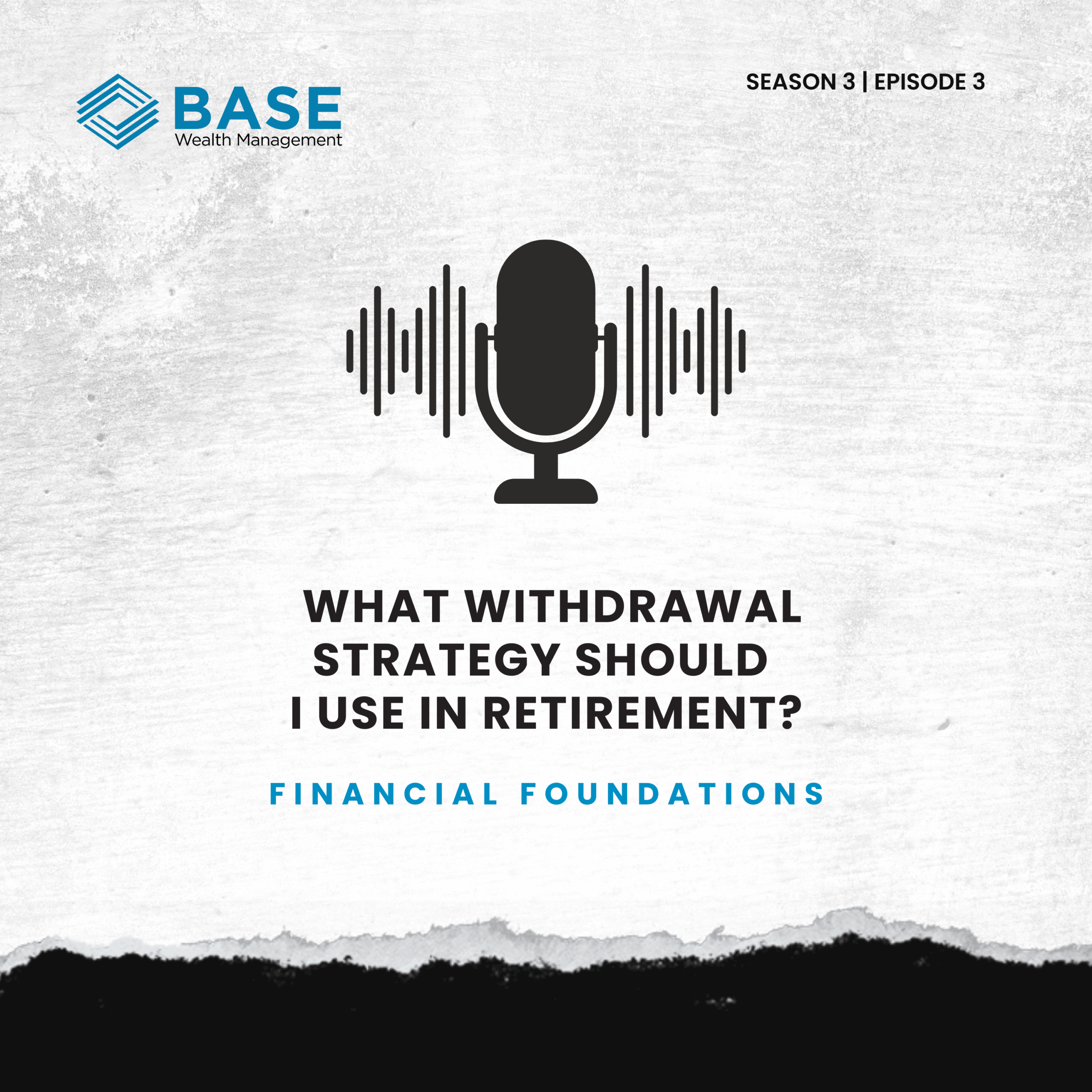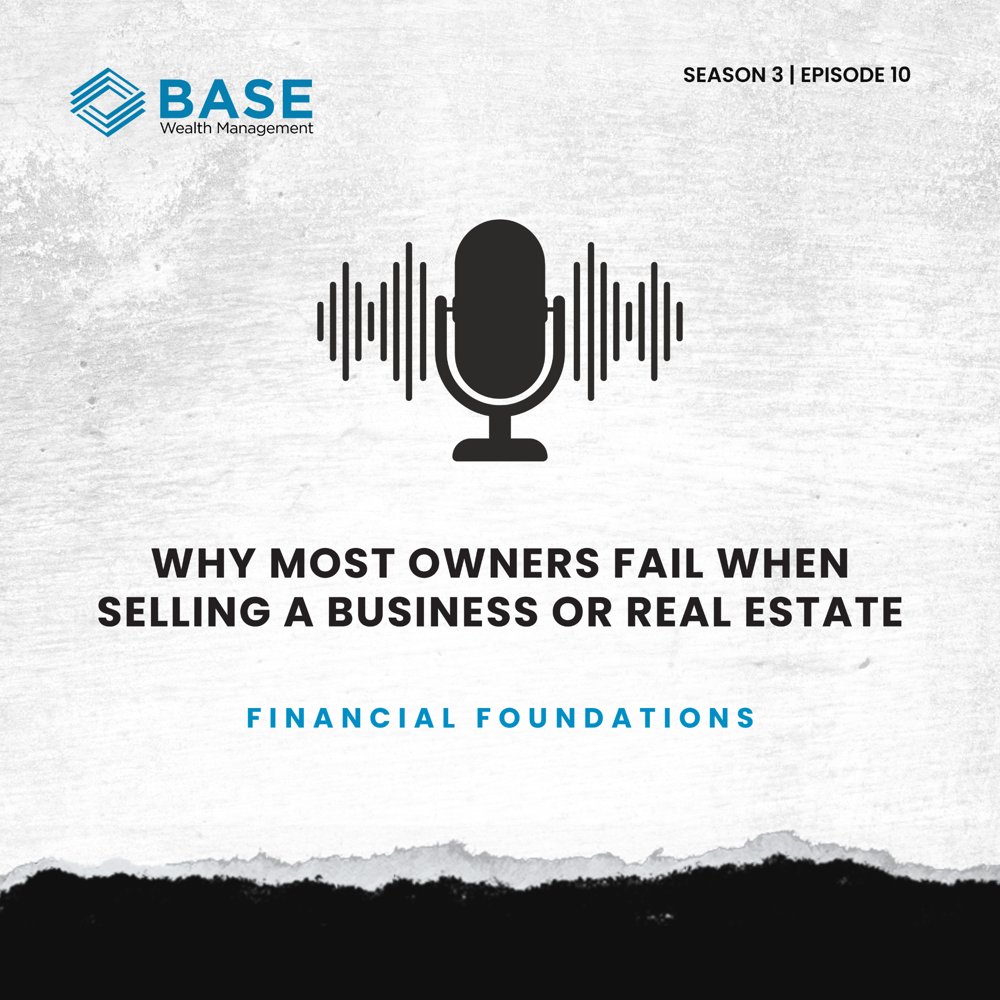
Transcript:
Welcome back to Financial Foundations, brought to you by Base Wealth Management, where we are the foundation to your financial plan. I’m your host, Dustin Taylor. I’m your co-host, Alex Wolfe, Certified Financial Planner. It’s important to know that the way in which you withdraw your funds in retirement can greatly affect the longevity of your portfolio. So today we want to talk about retirement income planning and withdrawal rates. So Alex, let’s talk about some strategies to consider when withdrawing from your portfolio. What’s the most effective way to determine the rate? Well, we’ve all heard the 4% rule, and we’ve done videos and podcasts talking about that 4% rule. And that’s one of the most simplest forms, like if you’re only withdrawing 4% of your portfolio per year and it’s growing at at least 4%, theoretically, you would never end up touching your principal. But we know that’s, you know, on paper, different than in practice. So we can’t always count on that to be true, especially if you are taking withdrawals from your portfolio in down markets and then that’s something that we’ve also talked about is sequence of Withdrawal risk where you’re withdrawing every month and the markets down every month when you withdraw
You could deplete your portfolio much quicker than if you’re doing the same 4% withdrawal rate when the markets Positive and returning positive returns on your portfolio So I like to look at it more big picture first and determine How much you need to withdraw from your portfolio to Live off of and first you need to determine what your lifestyle is, you know While you’re working and earning a paycheck, you’re accustomed to getting your paycheck You know roughly every two weeks and when you’re in retirement, that’s not the case you need to work with a professional to determine the right type of withdrawal and when to Support your spending and make your assets last Potentially for a long time if you retire early and people live, you know much longer now than they did 20 years years ago, you might need to withdraw funds monthly or, you know, biweekly for many, many years. How can retirees balance income from different sources such as Social Security or a pension, et cetera?
Yeah, that’s a key component to your income withdrawal strategy is first knowing how much you’re going to need and then adding up those other sources of income. Do you have a pension? Are you claiming Social Security or is that going to be coming in a few years depending on how you’re optimizing your Social Security plan? And then your retirement assets, how much money you’ve got in IRAs, 401Ks, Roth accounts. You have a Roth 401K or a Roth IRA because that’s going to help you be able to construct your withdrawal strategy from a tax standpoint is looking at your different buckets of taxable assets or non-taxable and where the optimal way to take that income from is, and it might change over the years. If you’re in a relatively high tax bracket now, maybe you want to withdraw from Roth if you think you’re going to be in a lower tax rate in the future, or are you in the belief that tax rates are going to go up in the future and you’re below RMD age and you should maybe heavily consider conversion. So not only are you taking income to live off of, but you also might be thinking about how to save on taxes in the future, which might incorporate Roth conversion. So there’s a ton of moving pieces there.
All right. And we know that the market can definitely be volatile. So how can retirees or investors prepare for that? When it comes to income, you might want the type of income from your investments that are going to be in the form of dividends, bond interest, CD interest, interest bearing investments. But that’s not going to also necessarily help you with long-term growth of the portfolio or future income. So you want to work with your financial professional to construct the portfolio in a way that meets your goals. If you need more income now, you might want to talk about how to get more income from the portfolio, or if you don’t necessarily need as much income today but in the future you will, maybe you want to invest in a more balanced approach that is more growth now and then adjust in the future. You also might consider setting aside cash or selling assets when the market’s up, take those gains and move into safer types of investments so that way if the market does drop you’ve got the right type of either cash or income producing securities where you don’t necessarily have to rely on market returns to support your spending. And I know that withdrawing from your portfolio can be a taxable event, so how can retirees minimize the effect of taxes on the portfolio or make it tax efficient?
So, some of us are fortunate, or some of you may be fortunate, where you’ve got different assets saved in different types of tax styles of accounts. You’ve got Roths, you’ve got traditional or rollover, and maybe you’ve got after-tax like brokerage account. And then on top of that, on the other side, is your pension or social security. Those are going to be taxed at income tax rates, much like a rollover or traditional IRA or 401k. And then you’ve got your Roth accounts that may be taxable if you’re really young. If you withdraw the money early, prematurely, you might have a penalty. So age is a consideration there when withdrawing from these accounts too. But the ideal approach would be to examine how much money you need on a monthly basis and determine the right way to get that income from those different accounts.
Whether you take it all from a traditional, every dollar of that’s going to be taxed at income tax rates or are you pairing that with Roth funds where maybe you’re splitting it half from your Roth and half from your traditional, or also factoring in maybe that brokerage account, or if you sell something you’re paying a lower capital gains rate than income tax. So we have a software, we use Holistic Plan and Right Capital to help us construct that withdrawal strategy to minimize the taxes as much as possible. You might be in a situation though where all of your money might be taxed at income tax rates and not necessarily have any Roth funds, and that’s okay too. We can help you determine what your potential tax liability will be, and if there’s any potential to think about conversions, as we touched on a little bit ago, to reduce future tax liabilities.
And then there’s that, you know, coming down the pipeline at potentially 73 or 75 based on your birth year of required minimum distributions, which could be a big headache if you’re someone who doesn’t necessarily need to live off of your IRA withdrawals, you might have a big RMD coming in the future to plan for, or to start thinking about conversions to reduce that. Right. And so let’s move on to a hot topic, at least right now, and that is inflation. How can you protect your portfolio against inflation? Inflation is a big killer for retirees, and I don’t say that lightly. When we think about financial plans, two years ago, we increased the base inflation rate from 2% in our financial plan to two and a half. It’s just a half a percentage more inflation per year, but think about your retirement plan. It’s 30 or 40 years long, maybe, or 20, however long you’re in retirement. So that half a percentage more in inflation is very detrimental to a financial plan, especially if you’re on a fixed income. A lot of retirees don’t have a way to make more money necessarily.
They’ve saved what they save through all their working years and then your investments are going to play a critical role. But we don’t want to have to chase investment returns to keep up with inflation if we can protect with other types of investments that are inflation hedging or will do better during inflationary times. You want to make sure your advisor or financial planner is keeping up with the right types of investments for the right type of times and during inflation you might need to increase your income from the portfolio. What I mean by that is you might need to increase your dividend income or while rates are high increase your bond portfolio. You might consider commodities or real estate or other types of investments that might do well during inflation but it’s definitely a big conversation to have because you know your dollar is going to have to stretch farther while inflation is higher. You know your essential spending on groceries, gas, those types of things are things that you need to spend on.
But unfortunately, you might have to cut back in other areas if your plan does not support the increased inflation. All right. We also talk a lot about risks when we talk about retirement. And one of those is longevity risk, which you kind of touched on earlier. People are living longer these days. How can retirees or investors protect against rising health care costs and, I guess, extended health care costs because they’re living longer? Yeah. The earlier you can plan, the better. So don’t wait a year before you’re retiring to come see a financial professional. You should be working with them years in advance to make sure that they’re factoring in all these different costs into your financial plan. Longevity risk, you know, the potential of outliving your money. With that comes Social Security optimization.
How can we make Social Security the most optimal for you? Is it delaying until 70? Is it taking it early? If you’re married and you’ve got two Social Securities, you make you know, want to look at some scenario analysis where you’ve got one spouse outliving the other by a considerable amount, because you don’t get to keep both social securities if one passes away early. You usually keep the higher benefit amount. So if you’ve got spouses with different social security numbers, there’s some optimization to think about there. When it comes to pensions and survivor benefits, we can help do a pension analysis to show you what your pension would be like if you do a 50% survivor, 100%, different plans allow for different survivor options, but that’s definitely something to consider.
Life insurance, you know, if you are someone who, you know, has a family history of not living that long, you might want to consider getting life insurance if you’re still insurable to set the other spouse up or the survivor with, you know, a nice little nest egg. And then comes investments, making sure you’ve got different parts of your investment portfolio set up to help you with that future, like 20 years down the road growth to make sure that you’re not gonna outlive your money. And then are you someone who has a family history of medical issues? Do you need to consider long-term care? Are there insurance policies that are attractive for you that are gonna cover some expenses? Or are you able to self-insure for long-term care? So there’s definitely factors there when it comes to social security, pension, investment portfolio optimization and healthcare considerations when it comes to longevity and living a long time. I think that the encompassing theme here is that all of these considerations are put into the financial plan, right? But a financial plan isn’t just set it and forget it, right?
How often should people review their financial plan? Yeah, good question. At a minimum, you should be reviewing your financial plan annually, but if you’re like right before retirement or right after retirement, you might want to consider reviewing it semi-annually or quarterly, or anytime a big life event happens. Meet with your financial planner to go over the plan and say, okay, how does this affect me? Oh, I want to give $10,000 to my kids. Is that something my plan can support? Or I need a new vehicle, or I’m going to put in a pool or a vacation. So there’s so many different scenarios. And I would say if it’s a big ticket item, meaning a few thousand dollars or more, that’s something that we can help you plan with and at a high level, it all starts with the plan. All right, so be sure to get your financial plan in place. And if you’d like any more resources or information, you can check out basewealthmanagement.com for various videos and articles and market recaps, et cetera. Also, make sure you’re subscribed to our podcast on your favorite podcast listening app. You can submit any questions or topics you’d like to see us cover on the show at question@basewealthmanagement.com.
I’m Dustin Taylor. I’m Alex Wolfe. And happy listening.









